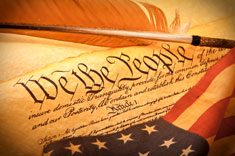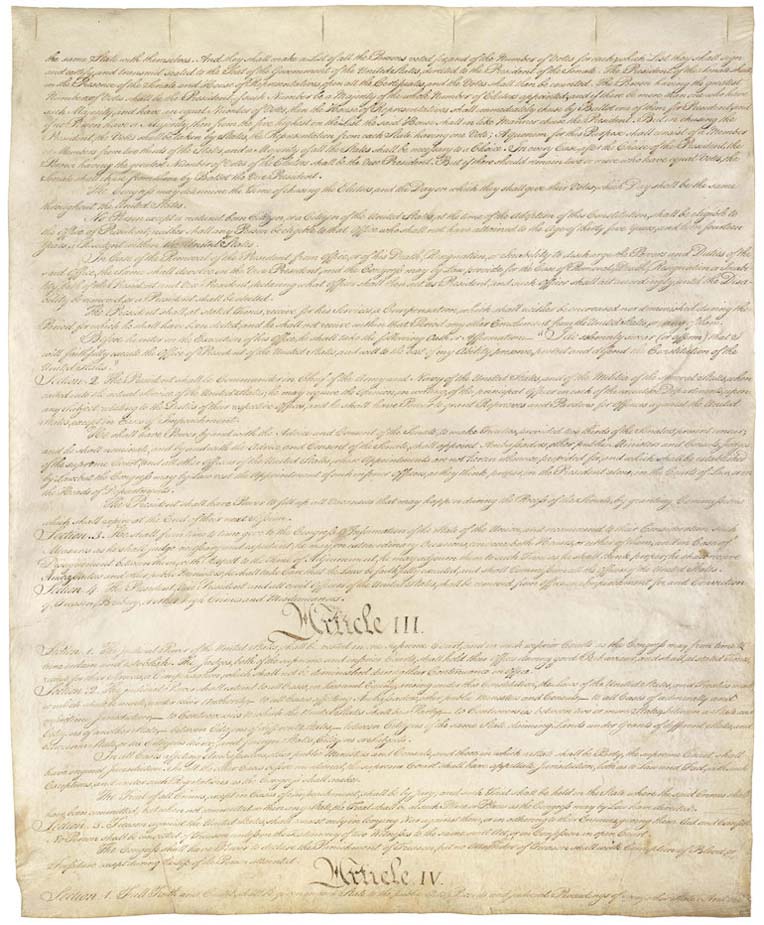| United States Constitution | |
|---|---|
 |
|
| The U.S. Constitution | |
| Preamble | |
| Articles of the Constitution | |
| I ‣ II ‣ III ‣ IV ‣ V ‣ VI ‣ VII | |
| Amendments to the Constitution | |
| Bill of Rights | |
| I ‣ II ‣ III ‣ IV ‣ V ‣ VI ‣ VII ‣ VIII ‣ IX ‣ X | |
| Additional Amendments | |
| XI ‣ XII ‣ XIII ‣ XIV ‣ XV ‣ XVI ‣ XVII ‣ XVIII ‣ XIX ‣ XX ‣ XXI ‣ XXII ‣ XXIII ‣ XXIV ‣ XXV ‣ XXVI ‣ XXVII | |
| View the Full Text | |
| Original Constitution | |
| Bill of Rights | |
| Additional Amendments |
Article 3 of the Constitution sets up the judicial division of the federal government. The article was ratified on 17th September, 1787 together with the rest of the constitution. At the Constitutional Convention, the participants wanted a justice system and therefore decided to create Article 3 about judicial branch. This branch consists of 4 different courts: Supreme Court with national jurisdiction, Courts of Appeals, District Courts and Court of International Trade. There are 12 Geographic based courts of Appeals and 1 for the Federal Circuit.
On the other hand, there are 94 District Courts in 50 states which also include Puerto Rico and the District of Columbia along with their subsidiary bankruptcy courts. All these federal courts have power to make decisions on just those cases over which the constitution authorizes them to. Most of these courts are located in the larger cities.
Origins of Article III
 During the Federal Convention in 1787, the participant agreed that their proposal for a new government would consist of a national judiciary. In that summer, Article 3 of the Constitution was drafted establishing a Supreme Court and leaving the Congress to decide whether other federal courts would be included in the nation’s judiciary. The article was more precise in its protection of some liberties and rights including: freedom from bills of attainder, assurance of trial by jury in criminal cases among other rights. The operation and structure of the federal judiciary was also shaped by several other articles of the U.S. Constitution. For instance, Article II gives the president the power to appoint judges with the Senate’s approval. Elsewhere, Article VI requires all judges to be bound by an oath to support the constitution. Article 3 has three sections.
During the Federal Convention in 1787, the participant agreed that their proposal for a new government would consist of a national judiciary. In that summer, Article 3 of the Constitution was drafted establishing a Supreme Court and leaving the Congress to decide whether other federal courts would be included in the nation’s judiciary. The article was more precise in its protection of some liberties and rights including: freedom from bills of attainder, assurance of trial by jury in criminal cases among other rights. The operation and structure of the federal judiciary was also shaped by several other articles of the U.S. Constitution. For instance, Article II gives the president the power to appoint judges with the Senate’s approval. Elsewhere, Article VI requires all judges to be bound by an oath to support the constitution. Article 3 has three sections.
Section 1: Federal courts
This section of Article III establishes the Supreme Court and also describes the terms of service of all federal judges. According to this section, the judicial power of the U.S. is vested in the Supreme Court and also in some inferior courts established by the Congress from time to time. At the moment, the Supreme Court consists of 9 judges appointed by the president with the endorsement of the Senate. The judges are allowed to hold their offices as long as they hold good behaviors, meaning that they can serve for life. In addition to that, the section states that the salaries of the judges should not be decreased while they are in office. This is meant to prevent members of Congress from punishing a judge whenever they dislike one of its decisions.
Every state has a number of lower courts, organized and created by the Congress. A case is usually filed and then tried in the District courts and in some specialty courts like bankruptcy or admiralty courts. Trial courts consider the facts of the case and then decide innocence or guilt, or the right side in a dispute or an argument. On the other hand, courts of appeals hear all the appeals of losing parties. Appellate courts look at whether the entire trial process followed the rules, fairness during the trial and whether the law was applied correctly.
Section 2: Judicial power and trial by jury
Section 2 of Article III consists of three clauses. According to Section 2, federal courts are entitled to decide arguments over how the constitution is interpreted, rights and responsibilities of the U.S. in conformities with other nations, and all laws that the Congress pass. Moreover, disputes arising between citizens, states, and states and the federal government can be heard in federal courts. However, federal courts make decisions on just those cases brought to them by an individual who has been affected by the law. These courts cannot create their own cases, even if they feel that a law is unconstitutional.
Generally, all federal cases are started in district courts where propositions are decided and trials held. Appeals are held at the courts of appeals or sometime at the Supreme Court if 4 out of the 9 justices of the court decide to hear the case. Congress can influence the power of courts of appeals by changing the regulations about which the cases can be appealed. Supreme Court can also hear state cases involving an issue of federal law, after the highest court in a particular state rules or refuses to rule in such cases. However, the Supreme Court only accepts few cases for review (usually about 80 cases in a year). Cases involving public ministers and consuls, where a state is a party or cases involving ambassadors, are initially heard at the Supreme Court. Federal courts also have final decision over innocence or guilt in federal criminal cases. Defendant in such cases (except impeachment) are guaranteed to have their cases heard by a jury in the specific state where the crime took place. If the crime was not done in a particular state, then the case is heard in a place formerly fixed by the Congress.
Section 3: Treason
This section describes treason and its punishment. Apparently, treason is the only crime that has been specifically defined in the U.S. Constitution. According to section 3 of Article III, an individual is guilty of treason when he or she goes to war against the U.S., aids or gives comfort to an enemy. Such a person does not have to be specifically holding a weapon and fighting in a battle against the U.S. troops. By helping an enemy through supplying weapons or passing of classified information, one can be charged of treason. It is important to note that demonstrations and vocal opposition to any U.S war effort, is protected by the free speech clause in the 1st Amendment. This means that people holding such demonstrations and oppositions cannot be charged of treason.
Conviction of treason should be based on either the testimony of 2 witnesses or when an accused person admits being guilty in an open court. Congress can set the punishment, but such punishment should only be directed to the guilty individual and not his or her family or friends if they did not participate in the crime. Furthermore, Congress has the power to confiscate the properties of traitors only while they are alive. When the traitor dies, his or her properties should be made inheritable to their next of kin.